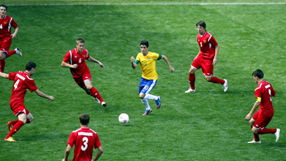Oscar transfer fee shared around in Brazil
The transfer fee Chelsea paid for Brazilian Oscar will not all go to his former club Internacional, an example of how the controversial practice of third-party ownership has taken hold in Brazil. The fee, which media have estimated at £25 million, will instead be divided up between two Brazilian teams, the midfielder himself and the entrepreneurs who own what are called his "economic rights". The London side completed Oscar's signing on Wednesday and the 20-year-old playmaker is expected to join Frank Lampard, John Terry, Fernando Torres and the rest of his new team mates when his Olympic duties with Brazil end next month. The transfer fee is one of the highest ever paid to a Brazilian club following the more than 21 million pounds Sao Paulo received from Real Betis for Denilson in 1998. It involves financial payments that are commonplace in Brazil but unusual in Europe, where transfer fees normally go directly from one club to another.

In Brazil and some other South American nations, players have two parallel deals, one for their playing rights and another for their economic rights.
The first stipulates which team the player plays for, the second who gets what if the player is transferred.
In addition to their clubs, companies, investment funds, the players and their agents can all hold a stake in a player's economic rights.
In doing so, they are investing in the player - usually when he is young - in the hope of making a profit if he is eventually sold for a big transfer fee.
"The easiest way to understand it is to think of football as you do the stock market, where the players are stocks," said Fabio Buratta, a businessman who has shares in Brazilian players.
"If I think that a young player is promising, I pay the club, say, 50 percent of what they think he is worth and in the future I will get 50 percent of whatever fee he commands. The risk is that the player doesn't make it and I lose my money."
In Oscar's case, 25 percent of his economic rights were held by himself and 25 percent by his agent, according to Internacional. The other 50 percent belonged to the club.
Get FourFourTwo Newsletter
The best features, fun and footballing quizzes, straight to your inbox every week.
That means half of Chelsea's transfer fee will go to Internacional, with the rest divided between the player and his agent. A small part of Inter's fee will go to Oscar's first club Sao Paulo under a separate sell-on clause.
PLAYER DEALING
Third-party ownership gathered strength in the middle of the last decade when impoverished Brazilian clubs realised they could hold on to an important player as well as secure a quick cash injection by selling a percentage of his contract.
Investors, including executives at two big supermarket chains, formed companies to buy and sell players knowing that one big sale could guarantee a significant return.
The only potential problem were regulations that only allowed clubs to buy and sell players.
World football governing body FIFA banned third-party ownership in 2008 after English football was hit by the controversial arrival of Carlos Tevez and Javier Mascherano, the two Argentine players who left Brazilian club Corinthians to sign for West Ham.
It was revealed that West Ham did not own the players' contracts and after investigations and court cases the London club was fined £5.5 million.
